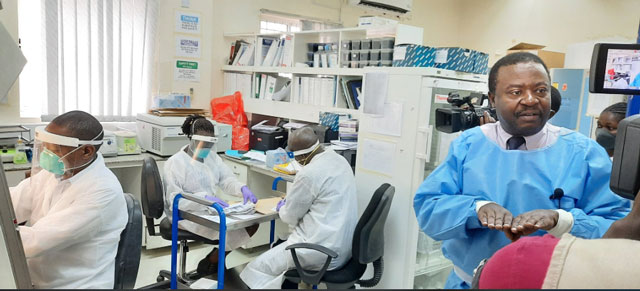
Kampala, Uganda | THE INDEPENDENT | Prof. Pontiano Kaleebu, the Director of Uganda Virus Research Institute-UVRI says testing samples for COVID-19 tremendously increased the institution’s publicity. But it was also the most tense phase in memorable history since the institute was established nearly a hundred years ago.
UVRI is a national, regional and international reference centre for some of the viral diseases such as HIV, Zika, Ebola, yellow fever and influenza. It is the national diagnostic reference centre for highly infectious viral infections such as COVID-19 and also the national HIV reference and quality assurance laboratory.
UVRI is also the national and regional reference centre for vector borne viral diseases, the Africa World Health Organisation-WHO yellow fever reference laboratory, a WHO measles and rubella reference laboratory and a WHO influenza collaborating laboratory.
Though the institution was established in the 1930’s, Kaleebu says some sections of the public were not aware of the role it has been playing in research on viral transmitted infections in animals and human beings.
However, Kaleebu told Uganda Radio Network that the institution has been in the limelight for the past one year, thanks to the pandemic.
He says the institution was in the public domain from early 2020 because it was charged initially with the sole role of testing COVID-19 samples, sequencing of the virus and also validating test kits for the lethal virus. However, these roles put UVRI under pressure to deliver accurate and timely results.
Kaleebu recalls that the institute’s worst and best moment was during the total lockdown, from March 18 to early June 2020. It was a tense moment because the public and the world religiously followed the daily updates from UVRI and the ministry of health.
As a result, testing samples and releasing timely results increased pressure on him and the 60 people involved, such as laboratory scientists and data specialists. “It was a tense time for us, but it was also an opportunity for us to get known by the whole country on the role such institutions play,” he says.
Kaleebu says that the public is also more aware about his role at the institute, to the extent that some children once referred to him as “Mr. COVID.”
Parliament allocated UVRI 9 billion Shillings in the 2020/2021 financial year. It was allocated the same amount in 2019/2020 financial year to fulfill its mandate and carry out activities including communication and engagement. However, Kaleebu says the institute got free publicity during the pandemic.
A cross section of the general public agrees with Kaleebu, saying they learnt about the institute because of the COVID-19 tests and results.
However, some people like Ashraf Balikoowa, a resident of Abaita Ababiri, Katabi town council says they have always known about the institute.
Balikoowa however says he was not aware that the institute was dealing with COVID-19 samples.
****
URN
 The Independent Uganda: You get the Truth we Pay the Price
The Independent Uganda: You get the Truth we Pay the Price



